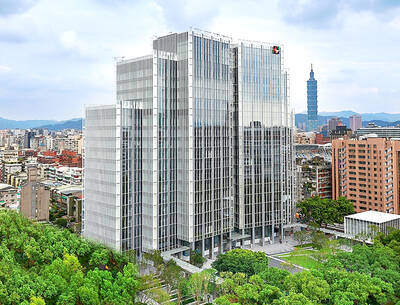China is halting private equity funds raising money to invest in residential property developments, turning off the spigot on one of the last stable funding resorts for the struggling sector.
The government-endorsed Asset Management Association of China (AMAC) has verbally informed private equity firms it would no longer be accepting the required registrations to set up funds to invest in projects, people familiar with the decision said, requesting not to be named because the matter is private.
Applications that have already been made would also be denied, while existing funds would not be affected, the people said.
The suspension adds to the challenges for Chinese property developers after regulators tightened funding channels, including bank loans and trust funding, as part of a campaign over the past years to reduce risks.
Some of the nation’s largest developers, such as China Evergrande Group (恒大集團), are struggling under massive debt loads built up during boom years in China’s property market and the sector is now driving a record surge in defaults in China’s bond market.
Yuzhou Group Holdings Co (禹洲集團) fell as much as 6.2 percent, the most in more than two weeks.
Evergrande has been one of the companies that have been battered by tightening funding in recent months, losing 61 percent of its value this year.
As traditional avenues of funding were choked off, real-estate companies turned to private equity funds backed by high net worth individuals and institutions to raise money, often using land or cash flow income from the project sales as guarantee. Most of the issuers of property funds are local companies.
Investment into equity funds focused on real estate stood at 843 billion yuan (US$130 billion) by 2020, 13.5 percent of the total sector, according to a report by AMAC.
AMAC did not respond to requests for comment.

UNCERTAINTY: Investors remain worried that trade negotiations with Washington could go poorly, given Trump’s inconsistency on tariffs in his second term, experts said The consumer confidence index this month fell for a ninth consecutive month to its lowest level in 13 months, as global trade uncertainties and tariff risks cloud Taiwan’s economic outlook, a survey released yesterday by National Central University found. The biggest decline came from the timing for stock investments, which plunged 11.82 points to 26.82, underscoring bleak investor confidence, it said. “Although the TAIEX reclaimed the 21,000-point mark after the US and China agreed to bury the hatchet for 90 days, investors remain worried that the situation would turn sour later,” said Dachrahn Wu (吳大任), director of the university’s Research Center for

Alchip Technologies Ltd (世芯), an application-specific integrated circuit (ASIC) designer specializing in artificial-intelligence (AI) chips, yesterday said that small-volume production of 3-nanometer (nm) chips for a key customer is on track to start by the end of this year, dismissing speculation about delays in producing advanced chips. As Alchip is transitioning from 7-nanometer and 5-nanometer process technology to 3 nanometers, investors and shareholders have been closely monitoring whether the company is navigating through such transition smoothly. “We are proceeding well in [building] this generation [of chips]. It appears to me that no revision will be required. We have achieved success in designing

PROJECTION: KGI Financial said that based on its foreign exchange exposure, a NT$0.1 increase in the New Taiwan dollar would negatively impact it by about NT$1.7 billion KGI Financial Holding Co (凱基金控) yesterday said its life insurance arm has increased hedging and adopted other moves to curb the impact of the local currency’s appreciation on its profitability. “It is difficult to accurately depict the hedging costs, which might vary from 7 percent to 40 percent in a single day,” KGI Life Insurance Co (凱基人壽) told an investors’ conference in Taipei. KGI Life, which underpinned 66 percent of the group’s total net income last year, has elevated hedging to 55 to 60 percent, while using a basket of currencies to manage currency volatility, the insurer said. As different

Taiwanese insurers are facing difficult questions about the damage of recent swings in the New Taiwan dollar. Regulators might have a partial solution: letting firms change how they calculate the value of foreign currency assets. The Financial Supervisory Commission (FSC) is considering allowing insurers to use six-month average exchange rates when they calculate risk-based capital in their semiannual reports, a shift from the current system where insurers use exchange rates on the final day of reporting. The change could ease pressure on the US$1.2 trillion insurance sector, whose huge exposure to foreign assets came into the spotlight earlier this month after a